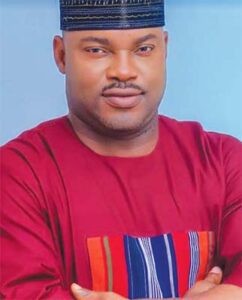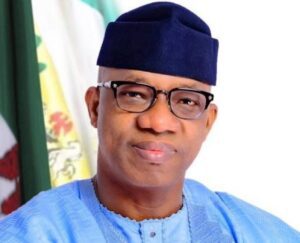
How we transformed Osun’s Education Sector through institution & policy reforms — Commissioner
Hon. Folorunso Oladoyin, A.K.A Bambam, is the Commissioner for Education in Osun State. In this interview with Azeez Ismail, Osogbo, he gave insight into how the present Administration effected transformational course in the State’s education system, using institutional and policy reforms. According to him, the shift made education in the State depart from the clustered arrangement which fractured the system. Excerpts:
As the Commissioner for Education, how can you describe the education sector yesterday and today in Osun State?
We thank God for the opportunity given to us to manage education over the last two years. I give kudos to all the people that have come before me, they did their best, but education is an evolving thing. It’s a work-in-progress affair. We must constantly work on it. So while my predecessors were here, they did their best, and we took it from where they left it. We’re also trying our best now. Since we came, we’ve had to carry out some reforms including institutional reforms and policy reforms. On policy reforms, we abolished the single uniform policy. We also put an end to the 4-5-3-4 policy and aligned to the national 6-3-3-4 policy. We also stopped the abolition of single-sex schools policy and returned single-sex schools to their former status. We also stopped the policy on automatic promotion. Since we came on board, if you fail, you will repeat; there is nothing like automatic promotion again. And we have established the Osun State Education Board to conduct all examinations, standardise our examination in the State and then we’ll be able to use examination for the real purpose for which exams are usually conducted – that is, to know the strengths and weaknesses of our students, work on their weaknesses, while they reinforce their strengths were it’s necessary. So now, we have an examination board to conduct the promotional exams in all our schools. We allow the principal to conduct first and second terms exams, but the board will conduct the unified exams. We have also introduced, as a policy, Common Entrance Examination into JSS-1 and into SS-1 which is the newest thing in the state. Before, it used to be automatic promotion: You move from primary six en masse to JSS-1. Students are now made to write entrance exam and it’s only when you pass you can advance. If you fail, you will repeat ditto, it is not automatic to move from JSS-3 to SS-1 again. JSS is the end of basic education. So, for you to advance, you must now sit for an entrance exam to SS-1 and these two entrance examinations are also conducted by the examination board. So, we have a body charged with the responsibility of conducting standardised examinations in our state and also interpreting and interrogating the outcome of examinations so that we can, based on that, work on our teacher’s work on our learners. If a teacher specialises in producing F9 parallel students, we know something is wrong with that teacher. If learners are also not doing well, we’ll investigate and know why they are not doing well. So, examination is not an end by itself, it is just a means to an end. It is an instrument for you to know the strength and weaknesses of your learners. So, that is as far as policy reform is concerned.
The other aspect of reform is institutionalised reforms. We have also looked at the Ministry as was constituted. The Ministry as constituted when we came on board was not such that can guarantee efficient performance and service delivery. So we decided to carry out the institutional reform. For instance, when we came on board, the Ministry of Education had 18 Permanent Secretaries (PS) and the Federal Ministry of Education, as large as it is with all the MDAs under it, has only one Permanent Secretary, compared to Osun State Ministry of Education with just about seven or eight departments and agencies.
So, there were fractures here and there, arising from the overlap of responsibilities. It was on record that the Ministry was almost unmanageable. So, we decided to reform the Ministry itself to make it so slim. And what did we do? We reduced the number of PS to one, reduced the head of agencies to Executive Secretaries and Tutor Generals. So, instead of having Tutor General PS, we now have mere Tutor General (TG). Instead of having PS heading some agencies, we have executive secretary heading them, so you can have a pyramid hierarchical structure. We have the PS at the top, followed by all the executive secretaries and the TGs, and then the directors and down to the last sphere of authority. So, the reporting line is very clear, making the hierarchy of authority very clear. With this system, you know who is your subordinate and who the superior is. There’s no way you are going to have 18 Permanent Secretaries and you will not have friction or power tussle. So, we have eliminated all that. We reconditioned the Ministry and make it as slim as we can for efficient service delivery.
There is a proliferation of private primary and secondary schools in the State, what is the Government doing to checkmate this and how many of them have you sanctioned?
When we came on board, we did a rough survey on what is going on in the private educational sub-sector. We discovered our target, that we have an estimated 6,000 plus private schools both primary and secondary. The first thing we did was to look at the Ministry itself, like I said, and we decided to do some thinking. So, we looked at the department of schools, we discovered that the Ministry had just a department of school that was in charge of both public and private schools. The question is even if the Ministry has the strongest persons in the world, how do you expect it to efficiently and effectively supervise and superintend 1,309 Primary schools, over 650 public secondary schools, then over 6,000 private schools. What we did was to seek the consent of the governor, Mr. Gboyega Oyetola, to break the Department of Schools into two. So, we now have a Department of Public Schools, and then a Department of Private Schools, both headed by directors and both with full fledge bureaucracy to back them. So, with the bureaucracy backing them, you now have a Department of Private Schools that is in charge of private schools in the State. Again we looked at how many of these schools are registered, and we discovered that less than 1,000 of them. So, we constituted a task-force; we gave them three Lexus vehicles to move around. Now, look at the schools; look at the structure of the schools, look at the quality of their teachers; look at the content they are teaching. So, when you have buildings without windows, or buildings without toilets, dilapidated structures, that are not conducive for human habitation, we close them down. Where they have fairly decent buildings, but they do not have quality teachers – in other words, they use quacks, people that are not TRCN (Teachers Registration Council of Nigeria) registered, we will not close them down, but we’ll give them a timeline of two years within which to make sure that all their teachers sit for TRC and registration, or hire people who already have TRC registration, because we don’t want to shut them down, so we don’t ruin people’s livelihood. We know it is not easy out there. There are no jobs and when people are creative and they have started something on their own, the least you can do is to support them. However, when you are supporting them, it must not be to the detriment of our children, for the future of our children, or to the detriment of the image of the state to me. But most importantly, it will not be to the detriment of the future of our young ones. So if you have fairly decent infrastructures, and we know that you are passionate about education, but just you’re using quacks, we will give you time to hire quality teachers. We will give you probation registration if you are not registered. With that, we will then give you a timeline of two years to regularise and put up to fulfill all the requirements. Good building, quality teachers, and registration; If we’re able to satisfy that, we will register you fully; if after two years you are unable to meet up requirements, we close your school down. But when you don’t have good structures or fairly structures and you still don’t have quality teachers and you don’t have all the listed requirements on our checklist, we quickly close your school and we have closed down 300 if not over 400 across the state. This is because we cannot allow people like that to destroy the future of these young ones. The child’s brain is more like a clean sheet of paper; immediately you put the wrong thing on it, it sticks. Now because of our drive to clean the system up, everybody is on their toes. The ones with the dilapidated structures have looked for designed structures, moved to decent structures, the ones with poor teachers have recruited qualified teachers to avoid them being shut down. So, we have impacted on this sector. For very few of hundreds of schools that we have closed down, others have woken up and we are practically working to ensure that they comply with all our requirements. We have a long checklist, if you don’t meet up, we will give you a timeline and we’ll give you time to make up to comply.
In the history of education in Nigeria, History and Yoruba have been major subjects but they are no more lively now, what is the Government doing to revive back the two subjects in the school curriculum?
For us in Osun, it is not a problem because we looked into this about a year and a half ago. We took a memo to the Executive Council to make the teaching of History and Yoruba compulsory in all schools in Osun. The Executive Council graciously approved that memo and this became a policy of this government. From that moment, Yoruba and History are now two compulsory subjects in every school in the State. And to back it up, we have also added Yoruba teachers in this recent recruitment that we did. Although what we have was not the number that we love to recruit, at least we have started and the subsequent batches of the recruitment will also include Yoruba teachers. So ditto, for history also, we need to add to the recruitment of teachers. China is China today because they use their language to teach. Japan is Japan today because they have not abandoned their language. Scandinavian countries in Europe, are all teaching their languages; Finland, Norway, Sweden, teach their language.
So, Africa is backward today in finding it difficult to be creative and innovative. Because we learn in foreign-borrowed language, people will find it difficult to think in the language that’s not their own mother’s tongue. If people teach chemistry, physics among others with Yoruba, it will be clearer to our learners and they will not have to memorise because there is difference between understanding and memorising.
The problem with us in Africa and Nigeria in particular, is that we all memorise to score AAs in our exams, but immediately we finish the exam, we forget everything: But if you actually understand the concepts, you will internalise it. In 40-50 years time, you will not forget, you will still remember when it comes to application to real life situations. For something that you memorise, you don’t even know the application. You will memorise it for the purpose of passing your examination but once the exam is over, you just get rid of it from your brain. Teaching people in their languages, they will easily understand, imbibe, and internalise the concept. That is the beauty of learning in your own mother’s tongue.
So, Yoruba have a rich language that we must not abandon it. Beyond teaching Yoruba and teaching History, we are advocating that we must teach in our schools with our mother’s tongue and USID assisted us to translate all the textbooks from primary 1-3 into Yoruba and we’ve set a timeline when teaching from primary 1-3 would be done fully with Yoruba language and that will commence very soon. Teaching from primary 1-3 will be done with our mother’s tongue for all subjects very soon. USID has already assisted us in the translation of all the texts.
Most schools built by the previous Administration are in a dilapidated situation, and the present administration has done an integrity test, what is the Government doing to reposition them?
We have gone beyond the integrity test; the report of the professionals have been submitted to us and the Executive Council had passed same to us to commence work on remedial measures to restore the schools into very good shapes to correct all the issues around mega schools. For instance, for Wole Soyinka Mega school in Ejigbo, we have already written a memo, just waiting for approval to award the roof, and that will be done very soon because it’s a top priority for Mr. Governor. We’re also working on the other schools that require under-cleaning; the ones that need replacement of windows and tiles floors or tiles placement which will last longer. Already, we’re working on these and very soon we will renovate all the schools and restore them to shape.



